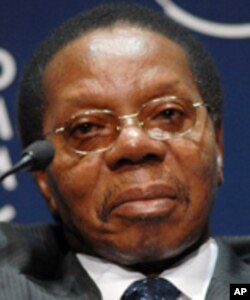Malawian President Bingu Wa Mutharika’s weekend pardon of a homosexual couple recently convicted for holding a public betrothal ceremony has drawn praise from U.S. President Barack Obama, and from Britain and a Malawian gay rights group. U.N. Secretary General Ban Ki-Moon, who was visiting Malawi at the time of the reprieve, called Sunday’s release of Steven Monjeza and Tiwonge Chimbalanga from prison a courageous decision.
Journalist Watipaso Mzungu of the Malawi Daily Times newspaper said Malawians’ reactions have been mixed. And, he said President Mutharika’s decision continues to raise a lingering question in a country that imposes stiff bans on homosexual behavior.
“Although they are not against the presidential pardon because he has just exercised his presidential powers, he (President Mutharika) has to answer a few lingering questions. If he is not bound to the international pressure, why is he only pardoning these two, because there are other gay people who were arrested here in Malawi. Why is he only releasing these two men?” asked Mzungu.
Two weeks ago, a Malawian judge convicted Monjeza and Chimbalanga of unnatural acts and sentenced them to 14 years in prison. The sentence has drawn criticism from governments and human rights groups. It has also sparked debate about activities by other African governments that are attempting to toughen penalties against homosexuality, which is illegal in 38 of Africa’s 53 states.
The Blantyre-based journalist noted that traditional religious group opposition to the legalization of homosexual unions remains very strong in Malawi, a predominantly (80%) Christian country. He said there are signs that President Mutharika, while signaling that he is not overturning state law, is clearly acceding to demands of the international community.
“The president has pardoned these two guys, mainly due to pressure from the international community. The opposition, too, cannot risk the wrath of their voters, especially considering that the donor community is providing Malawi with funds for the purchasing of subsidized fertilizer. Therefore, the opposition will put this behind them and concentrate on other matters of national interest,” said Mzungu.
Despite the international attention, he said Mr. Mutharika’s own political fate is not being threatened and that his critics will try to reach a common understanding for the benefit of the country’s development needs until the next election cycle in 2014.
“I don’t think the political future of Mutharika is in jeopardy. The president is serving his last term. It is the next presidential candidate of the Democratic Progressive Party that may suffer the wrath of the people. But, I doubt if people can connect it to politics,” he said.
After speaking with Undule Mwakasungura, the director of Malawi’s Center for Human Rights and Rehabilitation, Watipazo Mzungu, said he is not sure about legal and living conditions for Steven Monjeza and Tiwonge Chimbalanga. However, the Daily Times journalist said the country’s Minister of Gender and Child Welfare has told state media in Malawi that, “if the two guys go home and begin staying together, they are going to be rearrested.”
Mzungu said it is his clear understanding that President Mutharika is not trying to overturn the law, but is simply trying to find a way out of Malawi’s current clash with international human rights advocates, while signaling that violators of the current laws still face punishment.
“The president did emphasize that he did it (the pardon) on humanitarian grounds. Therefore, it is an expectation that the two guys will not get married again unless they want to face another jail term,” he noted.
With charges dropped against them, Monjeza and Chimbalanga still have the option of leaving Malawi. But, Mzungu notes that the Malawi government cannot be expected to advise them about whether or not they should leave the country.




